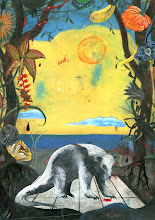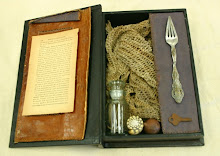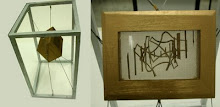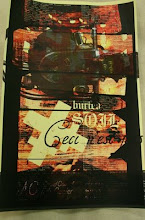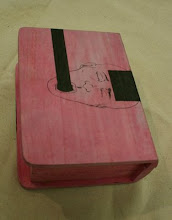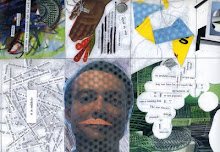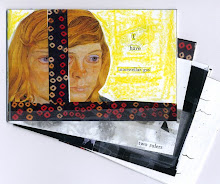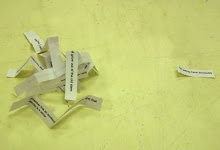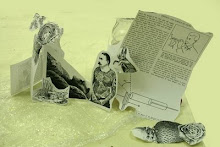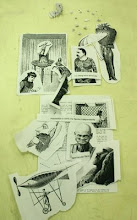VVP: Art 434 & Engl. 410
- Dan Callis and Chris Davidson
- Website for Vision Voice and Practice: An Interdisciplinary Course in Art and Creative Writing
Tuesday, February 28, 2017
Two Upcoming Events!
This Saturday, March 4th, are two big events, pertinent to students of (and fans of) this class:
1) The Biola Art Symposium, a free event beginning Saturday morning and featuring a host of visiting and resident scholars, exploring the theme of Art in a Post-Secular Age. Speakers include Sally Promey (Yale University) , James Elkins (Art Institute of Chicago) , Lori Branch (University of Iowa) , Edgar Arceneaux (USC) , Amanda Hamilton (Bethel University) , and others. More information, here.
2) "Ready to See," a show featuring the paintings of Dan Callis (one of the teachers of this class!) and the sculptures of Tina Linville opens Saturday night, and you're all invited! More information, here.
Wednesday, February 22, 2017
Thursday, February 16, 2017
Words as Access Points
In today's class, we talked about Walker Percy's essay "Metaphor as Mistake," which, among many other things, asserts that metaphor is more than simply a utilitarian means of describing empirically observed reality or an aesthetically motivated pleasure-trip through language play. Instead, he says that metaphor is (can be?) a "discoverer of being."
In our discussion, we brought up the claim, first discovered by me (Chris) via an episode of Radiolab, that until there was a word for blue there was no concept of blue in anyone's consciousness. Language, being itself metaphorical, gives us access, Percy says, to a "definite but fugitive" something. In other words, language gives access to experience and reality. (It also, of course, can be used to manipulate, reduce, and confuse.) Anyway, when we mentioned the notion that "blue" as a concept didn't exist because it didn't exist as a word, there was a minor delighted/dismayed upheaval among the students. Dan subsequently recommended the book Color, by Victoria Finlay. And here's a short write-up about this notion of blue.
In our discussion, we brought up the claim, first discovered by me (Chris) via an episode of Radiolab, that until there was a word for blue there was no concept of blue in anyone's consciousness. Language, being itself metaphorical, gives us access, Percy says, to a "definite but fugitive" something. In other words, language gives access to experience and reality. (It also, of course, can be used to manipulate, reduce, and confuse.) Anyway, when we mentioned the notion that "blue" as a concept didn't exist because it didn't exist as a word, there was a minor delighted/dismayed upheaval among the students. Dan subsequently recommended the book Color, by Victoria Finlay. And here's a short write-up about this notion of blue.
Tuesday, February 14, 2017
On Marianne Moore
These past two class sessions, we have spent a chunk of time reading to each other Marianne Moore's poems "The Fish" and "The Frigate Pelican." Here are some remarks about her remarkable work:
Moore has proved to be an engaging puzzle, not only to critics of her time but to later ones as well. It is seen that her themes broadened to a degree as she matured. In early works she emphasized a need for discipline and heroic behavior. Later she stressed the need for spiritual grace and love. To survive, she hinted, one must be alert, disciplined, and careful. Gradually she moved from scrutinizing one object to comparing several objects. She delighted in whimsically describing characteristics of animals and athletes, seeing both organisms as subjects and exemplars of art. Never dogmatic in propounding her morality, she often distanced herself and remained furtive by attributing declarative dicta to others and by commenting on quotations and even photographs expressing the point of view of others. For these reasons, critics have not yet reached a consensus--is she modern or anachronistic, imagistic or objectivistic? Regardless, Moore tremendously relished her quietly intense, largely bookish, often convivial life, made memorable to a host of friends by her rapid-fire talk. She was superb at her chosen craft. Her expression is notable for deftness and sharpness of detail, linguistic experimentation, and integration of fresh observation and obscure reading. She teases the reader into looking at reality with keener vision, as though, like her, seemingly for the very first time; challenges the reader to accept the relationship of big and little, animate and inanimate, ideal and object; and invites the reader to note, and practice, the power of words. To those who complained that her poetry often seemed obscure, she once replied that something that was work to write ought to be work to read. Her life displayed and her writings expressed the virtues of courage, loyalty, patience, modesty, spontaneity, and steadfastness.[The article this passage is from can be found here.]
- Elaine Oswald and Robert L. Gale
Friday, February 10, 2017
Thursday, February 9, 2017
Updated Post: Joseph Cornell & Wes Anderson
[The following was originally posted here May 31, 2012. It has been updated with images.]
Cornell, a mainstay of this class, gets a shout-out in Anthony Lane's elegant, even moving, review of Moonrise Kingdom:
[Anderson] is often spoken of as an arch-geometrician, drawn to cinema by the orders of symmetry that it allows him to impose. However, when I watch those graceful sideways tracking shots of his--through the Bishop residence, at the start of the new film, or along the train carriages, at the end of "The Darjeeling Limited"--what I sense is not a technical tic but a pressing need to bind people together even as they threaten to pull apart. (Anderson's parents, we may note in passing, divorced when he was eight.) Certain makers of musicals, like Stanley Donen and Vincente Minelli, were fêted or decried for their organizational verve and a fetishistic appetite for color; only with time did it emerge that what they sought was a shape for emotional longings, and that could happen here, too. Who knows, we may look back on Anderson's works as we do on the boxes of Joseph Cornell--formal troves of frippery, studded with nostalgic private jokes, that lodge inexplicably in the heart.
- from the New Yorker (the science fiction issue, May 2012)
Joseph Cornell, Untitled [Medici Princess] (1948)
Wes Anderson, shot from Moonrise Kingdom (2012)
Wednesday, February 8, 2017
Second Spot Collaborations (2/7/17)
Students were given photocopied images, text, scissors, tape, and whatever was at hand. (Click on the images for clearer resolution.)
Monday, February 6, 2017
First Spot Collaborations, 2017 (January 31)
Students were given photocopied text, tape, scissors, and time. This is what they made. (Click on the images for clearer resolution.)
Thursday, February 2, 2017
Subscribe to:
Comments (Atom)




























































































